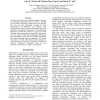Free Online Productivity Tools
i2Speak
i2Symbol
i2OCR
iTex2Img
iWeb2Print
iWeb2Shot
i2Type
iPdf2Split
iPdf2Merge
i2Bopomofo
i2Arabic
i2Style
i2Image
i2PDF
iLatex2Rtf
Sci2ools
117
click to vote
AAAI
2007
2007
Cautious Inference in Collective Classification
Collective classification can significantly improve accuracy by exploiting relationships among instances. Although several collective inference procedures have been reported, they have not been thoroughly evaluated for their commonalities and differences. We introduce novel generalizations of three existing algorithms that allow such algorithmic and empirical comparisons. Our generalizations permit us to examine how cautiously or aggressively each algorithm exploits intermediate relational data, which can be noisy. We conjecture that cautious approaches that identify and preferentially exploit the more reliable intermediate data should outperform aggressive approaches. We explain why caution is useful and introduce three parameters to control the degree of caution. An empirical evaluation of collective classification algorithms, using two base classifiers on three data sets, supports our conjecture.
AAAI 2007 | Collective Classification | Collective Inference Procedures | Intelligent Agents | Intermediate Relational Data |
Related Content
| Added | 02 Oct 2010 |
| Updated | 02 Oct 2010 |
| Type | Conference |
| Year | 2007 |
| Where | AAAI |
| Authors | Luke McDowell, Kalyan Moy Gupta, David W. Aha |
Comments (0)

